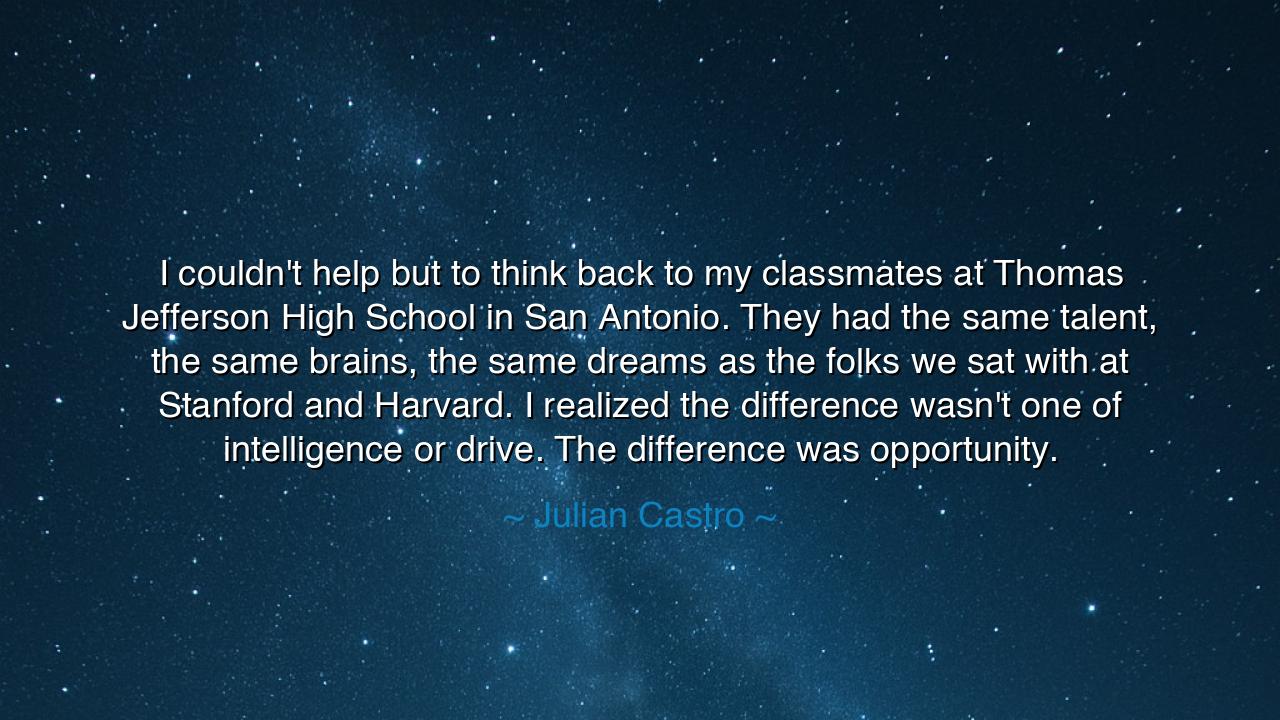
I couldn't help but to think back to my classmates at Thomas
I couldn't help but to think back to my classmates at Thomas Jefferson High School in San Antonio. They had the same talent, the same brains, the same dreams as the folks we sat with at Stanford and Harvard. I realized the difference wasn't one of intelligence or drive. The difference was opportunity.






The words of Julián Castro, spoken with the humility of remembrance and the clarity of wisdom, carry the weight of both truth and compassion: “I couldn’t help but to think back to my classmates at Thomas Jefferson High School in San Antonio. They had the same talent, the same brains, the same dreams as the folks we sat with at Stanford and Harvard. I realized the difference wasn’t one of intelligence or drive. The difference was opportunity.” In this reflection, Castro reveals an ancient truth — that the greatness of a person is often not determined by their potential, but by the paths opened before them. His words ring as both lament and revelation: that brilliance can be found in every corner of the world, but it flowers only where the soil allows.
In the tone of the wise, Castro speaks of equality of spirit but inequality of circumstance. He saw, with the eyes of one who had crossed both worlds, that the flame of genius burns as brightly in the child of a humble school as in the halls of the elite. Yet, while one is given light and nourishment, the other often grows in shadow. The lesson is not that some are destined to lead while others are not, but that opportunity is the sunlight of potential, and without it, even the strongest seed struggles to bloom. His words echo the old philosophers who taught that virtue and intellect are not bound by birth, but require cultivation — that the just society is one that waters every root.
From the dawn of civilization, this truth has been known and yet too often ignored. In the ancient academies of Athens, the sons of citizens studied philosophy and mathematics, while the children of laborers and slaves remained unlettered, their thoughts as sharp but their voices unheard. In the Middle Ages, knowledge was guarded by monasteries, and only a few could read the sacred texts. Even in the modern age, the gates of learning have not been equally open. Castro’s reflection is a modern echo of this eternal injustice — that talent is universal, but opportunity is not. His words call upon the conscience of his generation to ask, as Plato once did, “Who guards the gate to knowledge, and in whose name does he close it?”
There is a story from history that mirrors this truth — the story of Abraham Lincoln, born in a log cabin on the American frontier. His schooling was brief, his books few, his teachers scarce. Yet through determination and a mind unbound by circumstance, he rose to lead a nation. But for every Lincoln who triumphs against hardship, there are thousands whose brilliance never reaches the world’s ear. Castro’s revelation honors both the exceptional and the forgotten: those whose dreams withered not from lack of effort, but from the absence of doors to open. He saw that intelligence and will are not the privilege of the few, but the birthright of all — and that a just society must work to ensure that every soul has a chance to rise.
The emotional power of Castro’s reflection lies not in envy or regret, but in recognition. He speaks not to divide the fortunate from the less fortunate, but to remind the world of its unfinished work — the work of building bridges where walls once stood. When he says that the difference was opportunity, he is naming the invisible thread that binds destiny. Opportunity is not charity; it is justice. It is the recognition that progress depends not on the few who are lifted, but on the many who are allowed to climb. A nation that hoards opportunity betrays its own promise; a nation that shares it fulfills its destiny.
And yet, Castro’s insight is also a call to action for the individual. If opportunity is the difference, then each of us must become a creator of it — for ourselves and for others. The wise do not wait for chance to favor them; they seek to build ladders for those who come after. Teachers, mentors, and leaders become the architects of justice when they open doors where none existed before. In this way, opportunity becomes not a gift bestowed by the powerful, but a legacy of compassion and courage, passed from hand to hand through generations.
Thus, the lesson of Julián Castro’s words is both noble and urgent: intelligence and ambition are equal in all people, but fairness is not. To live wisely is to recognize that the measure of a society lies not in how it rewards its privileged, but in how it uplifts its hidden talents. Let each of us, in whatever corner of life we occupy, become a bringer of opportunity — a teacher, a guide, a voice that calls others forward. For when the gates of learning and labor are open to all, then will the world see the full flowering of its genius.
So, dear listener, remember this: the difference is not in the mind, but in the path. The seed of greatness lies everywhere — in every school, every street, every humble home. The task of our age is to make room for those seeds to grow. For when all are given the light of opportunity, the harvest of humanity will be richer than any dream — and the promise of equality, long deferred, will at last be fulfilled.






AAdministratorAdministrator
Welcome, honored guests. Please leave a comment, we will respond soon